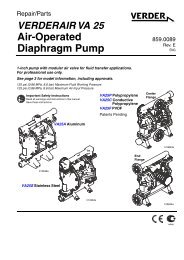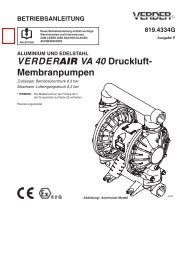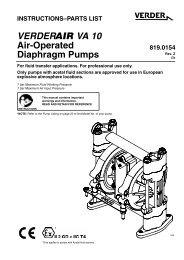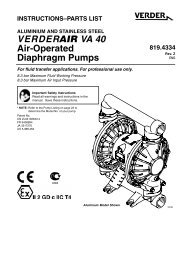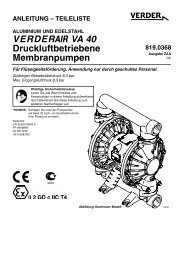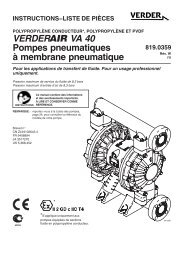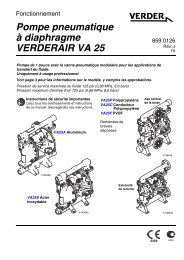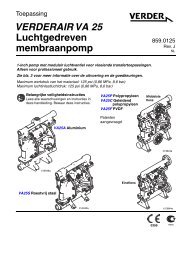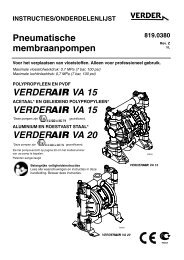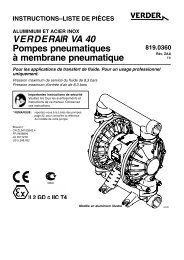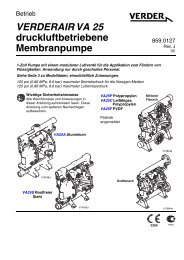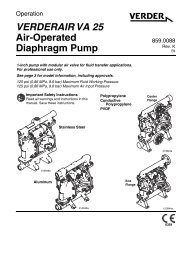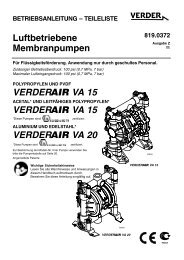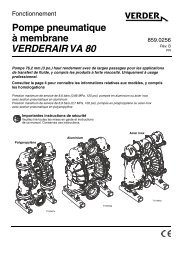Air-Operated Diaphragm Pumps VERDER VA 15 VERDER VA 15 VERDER VA 20
verderair va 20 - Double Diaphragm Pump
verderair va 20 - Double Diaphragm Pump
Create successful ePaper yourself
Turn your PDF publications into a flip-book with our unique Google optimized e-Paper software.
TOXIC FLUID HAZARD<br />
Warning<br />
Hazardous fluid or toxic fumes can cause serious injury or death if splashed in the eyes or on the skin, inhaled, or<br />
swallowed.<br />
<br />
<br />
<br />
<br />
<br />
<br />
Know the specific hazards of the fluid you are using.<br />
Do not lift a pump under pressure. If dropped, the fluid section may rupture. Always follow the Pressure Relief<br />
Procedure on page 10 before lifting the pump.<br />
Store hazardous fluid in an approved container. Dispose of hazardous fluid according to all local, state, and<br />
national guidelines.<br />
Always wear protective eyewear, gloves, clothing, and respirator as recommended by the fluid and solvent<br />
manufacturer.<br />
Pipe and dispose of the exhaust air safely, away from people, animals, and food handling areas. If the<br />
diaphragm fails, the fluid is exhausted along with the air. Read <strong>Air</strong> Exhaust Ventilation on page 6.<br />
Never use an acetal pump to pump acids. Take precautions to avoid acid or acid fumes from contacting the<br />
pump housing exterior. Stainless steel parts will be damaged by exposure to acid spills and fumes.<br />
FIRE AND EXPLOSION HAZARD<br />
Improper grounding, poor ventilation, open flames, or sparks can cause a hazardous condition and result in a fire<br />
or explosion and serious injury.<br />
Ground the equipment. Refer to Grounding on page 8.<br />
<br />
<br />
<br />
<br />
<br />
<br />
<br />
<br />
<br />
<br />
Never use a non–conductive polypropylene or PVDF pump with non-conductive flammable fluids as specified<br />
by your local fire protection code. Refer to Grounding on page 8 for additional information. Consult your fluid<br />
supplier to determine the conductivity or resistivity of your fluid.<br />
If there is any static sparking or you feel an electric shock while using this equipment, stop pumping<br />
immediately. Do not use the equipment until you identify and correct the problem.<br />
Provide fresh air ventilation to avoid the buildup of flammable fumes from solvents or the fluid being pumped.<br />
Pipe and dispose of the exhaust air safely, away from all sources of ignition. If the diaphragm fails, the fluid is<br />
exhausted along with the air. Read <strong>Air</strong> Exhaust Ventilation on page 6.<br />
Keep the work area free of debris, including solvent, rags, and gasoline.<br />
Electrically disconnect all equipment in the work area.<br />
Extinguish all open flames or pilot lights in the work area.<br />
Do not smoke in the work area.<br />
Do not turn on or off any light switch in the work area while operating or if fumes are present.<br />
Do not operate a gasoline engine in the work area.<br />
819.6900 3



